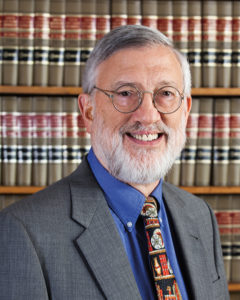Advocacy Support Counsel, Legal Aid of West Virginia

By Jean Hardiman. As a student at the Washington & Lee University School of Law, Bruce Perrone interviewed with corporate law firms in big cities, which was typical for students with good grades, but he didn’t have much to say to those folks. He found that his fire for the law kindled when he was helping the less fortunate.
Perrone earned an economics degree at Davidson College in North Carolina in 1975, when the concept of operating legal clinics to meet the needs of working people was still developing. During law school, he volunteered with a student-run legal aid program that was supervised by a local lawyer. He was also elected as an officer in the student bar, which afforded membership in the university’s honor system, and he participated in the law review and the university’s Women’s Law Students Organization.
After graduation, Perrone began his career in 1978 as a staff attorney at Legal Aid of North Carolina.
“It was absolutely everything I hoped legal aid could be,” he says. “I loved the clients, I loved the work, and I loved the advocates I was working with. We were all pretty new as lawyers and figuring it out as we went, but we made sure to have fun while we were doing it. In those days, we took just about any civil case that came in the door, and I learned to jump in and figure it out quick.”
It was the Reginald Heber Smith Community Lawyer Fellowship that brought Perrone to the Mountain State to work as a staff attorney for the North Central West Virginia Legal Aid Society in Morgantown. In 1981, he moved into the director’s position, but he stayed there only four years before taking a job as the litigation director at the Legal Aid Society of Charleston so he could get back to lawyering. Federal cutbacks led to the consolidation of West Virginia’s three surviving legal aid programs, and by 2002, Legal Aid of West Virginia (LAWV) had been established.
Today, Perrone serves as advocacy support counsel for LAWV, handling cases, coordinating support systems for litigation and advocacy across the state and posting resources to a website for fellow advocates. His responsibilities include co-counseling, assisting advocates through calls and emails, reviewing and editing written work and coordinating mock arguments for Legal Aid lawyers preparing for Supreme Court arguments.
Perrone has had administrative positions as well, and he has served on numerous committees and task forces related to everything from the implementation of the American Disabilities Act to landlord/tenant law to self-represented litigants. He also volunteered through the American Bar Association in 1999 to spend six weeks in Albania, consulting during the establishment of the country’s first legal aid program after the fall of its communist dictatorship in 1993.
“It was an absolutely fascinating experience on its own merits,” he says. “It also deeply enriched my own understanding of the role of legal aid, and the legal system generally, in strengthening the institutions of a vibrant democracy and respect for the rights of individuals.”
Ask him what he thinks his greatest success is, and he’ll say it’s hard to choose. He’s proud to have handled public benefit federal court class action cases, of working with legal aid programs in West Virginia and three other states to provide training opportunities for advocates and of his work in Albania, among other exciting endeavors. But it’s also rewarding to help an unemployed father feed his family or help a domestic violence victim get control of her life and show her daughter what empowerment looks like.
“When I see a picture of a disabled child with an ear-to-ear grin because he got a wheelchair that gives him a measure of independence for the first time in his life, and that was because of Legal Aid, that makes me smile,” says Perrone. “How can you not enjoy that?”
The choice of a career of service was a simple one for Perrone. “Simply put, it gives me more satisfaction than anything else I can think of,” he says. “I enjoy what I do, and I don’t think I would enjoy many other forms of law. There’s just something inside me that makes me tick this way.”








